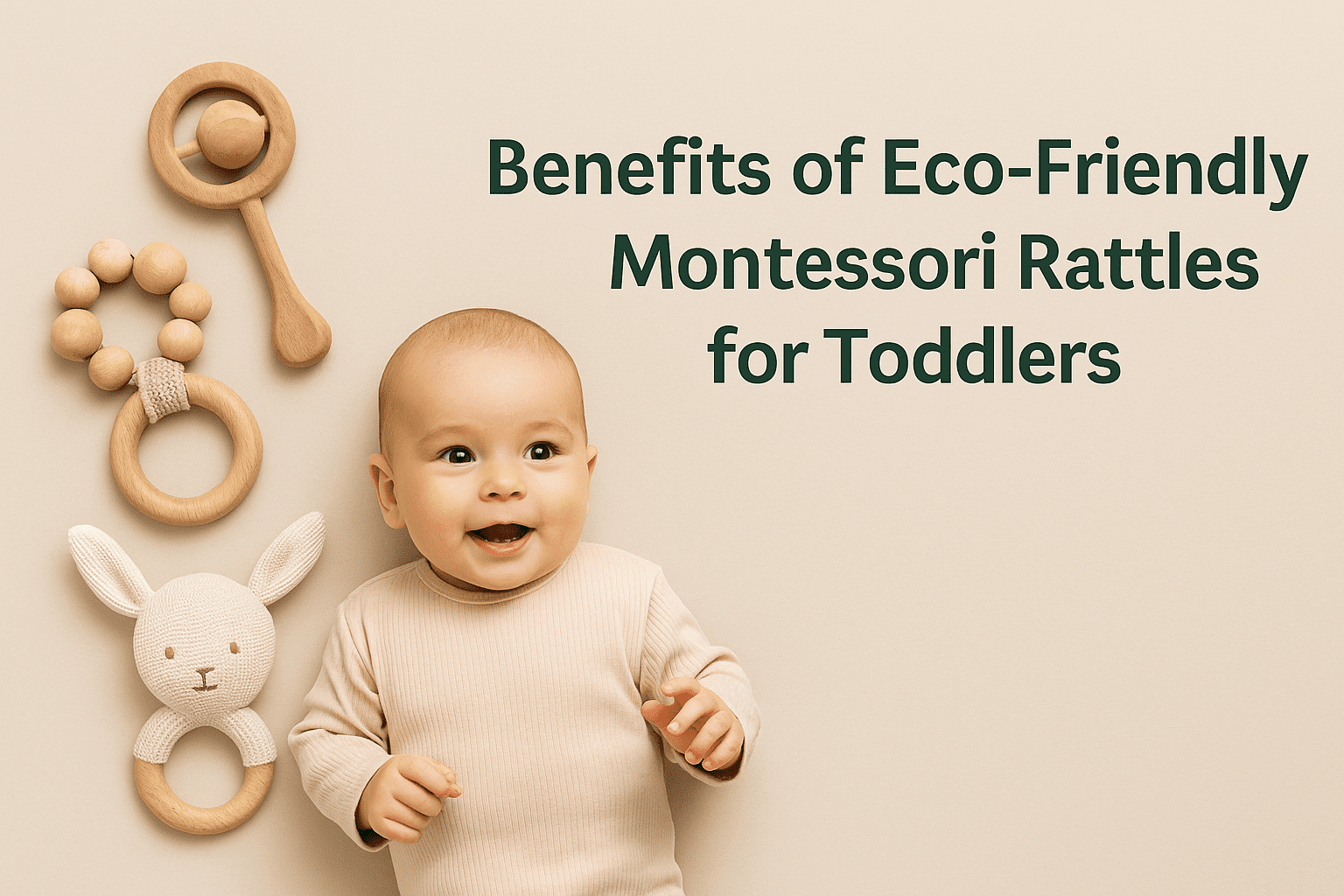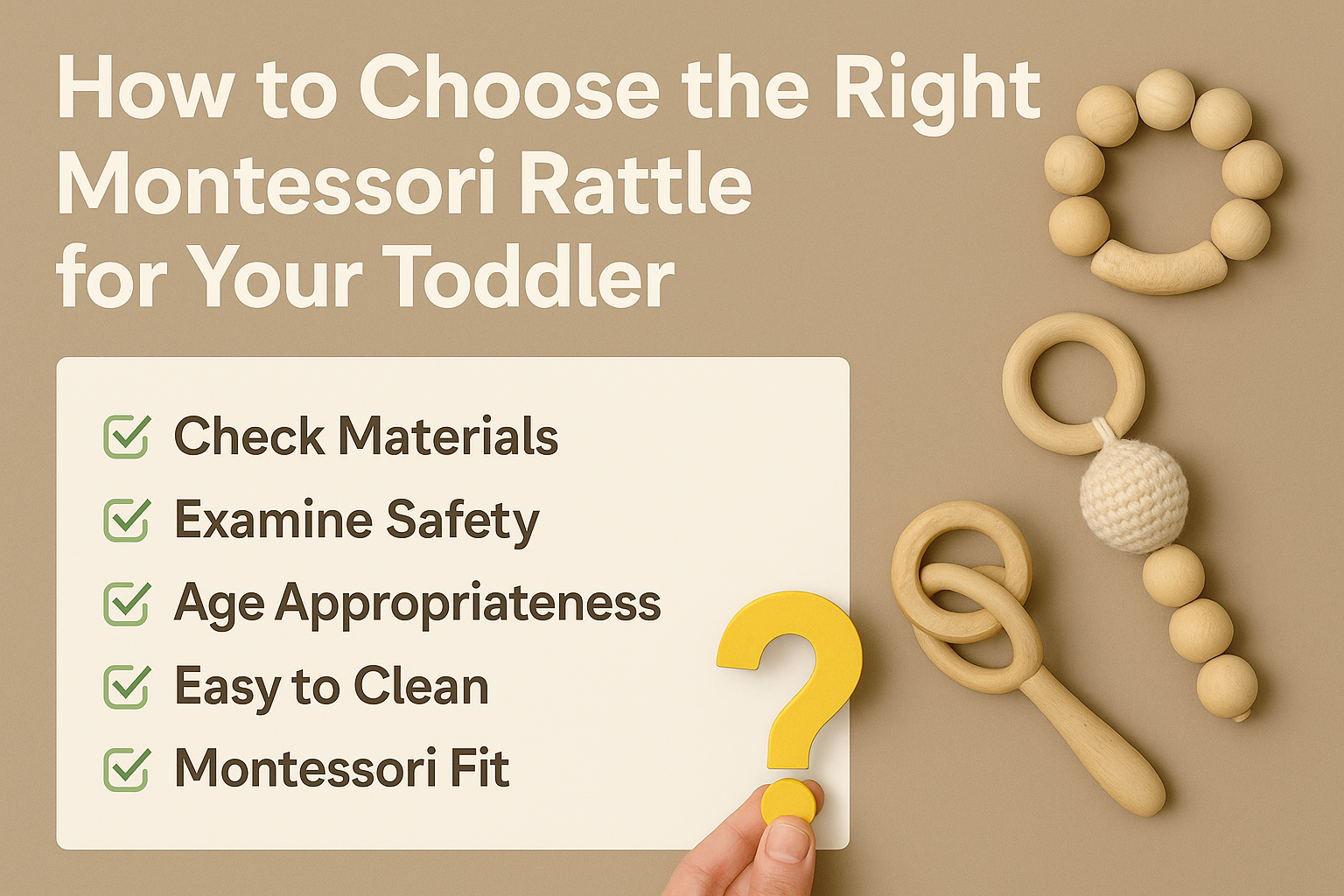Ultimate Eco-Friendly Montessori Rattles: Plastic Free Picks for Toddlers
Rattles are much more than baby toys—they’re one of the first tools that spark curiosity, develop senses, and encourage learning for toddlers. But as awareness about toxins and environmental harm grows in the USA, more parents are asking: “Are my baby’s toys really safe?” That’s why plastic free Montessori rattles for toddlers are booming in popularity among health-conscious and eco-aware families.
Plastic-free Montessori rattles are carefully crafted from natural, non-toxic, and sustainable materials. They follow Montessori principles, encouraging independent learning and sensory exploration in the safest way possible. From the smooth feel of wood to the calming sound of organic materials, these rattles aren’t just toys—they’re a lifestyle choice.
This ultimate 2025 guide will explain why plastic-free matters, the true benefits for your child, what materials to trust, top product recommendations available in the USA, and practical tips to help you choose the best Montessori rattle for your little one. Let’s get started and make your nursery both safer and greener!
What Makes a Montessori Rattle “Plastic Free”?
A plastic free Montessori rattle is more than just a toy without plastic—it’s a carefully designed item that puts your child’s health and the planet first.
Here’s what sets them apart:
Key Features of Plastic Free Rattles
-
Natural Materials: Made from sustainably harvested wood, organic cotton, bamboo, or even wool.
-
Non-Toxic Finishes: No harsh chemicals, varnishes, or paints. Only food-grade oils and plant-based dyes.
-
Simple Design: In line with Montessori philosophy—simple, functional, and beautiful, with no unnecessary decorations.
-
Handmade Quality: Many are crafted by artisans or small businesses, ensuring attention to detail and high quality.
-
Safe for Mouthing: Babies love to explore with their mouths, so these rattles are made to be safely chewed and handled.
Why Avoid Plastic in Montessori Toys?
-
Toxicity Risk: Many plastics can contain BPA, phthalates, or PVC, all of which are harmful if chewed or sucked on by babies.
-
Environmental Impact: Plastic toys are a major contributor to landfill waste and often end up as microplastics in oceans.
-
Durability Issues: Plastic toys can crack, break, or wear out, whereas high-quality wooden or natural rattles are long-lasting and can be handed down.
-
Montessori Alignment: Plastic-free toys fit the Montessori belief in connecting children to the real, natural world.
Info Table 1: Features vs. Benefits
| Feature | Benefit for Toddlers |
|---|---|
| Natural Wood/Bamboo | Safe, chemical-free play |
| Organic Cotton/Wool | Gentle on baby skin |
| Non-toxic Finish | No risk of chemical exposure |
| Handcrafted Quality | Durable, heirloom quality |
| Minimalist Design | Encourages focused play |
Info Table 2: Why Avoid Plastic?
| Issue | Plastic Free Advantage |
|---|---|
| Contains Toxins | No toxic chemicals |
| Breakable | Highly durable |
| Pollutes Earth | Biodegradable materials |
| Overstimulating | Calm, natural sensory input |
| Short Lifespan | Built to last years |

Benefits of Eco-Friendly Montessori Rattles for Toddlers
Switching to plastic free Montessori rattles isn’t just a “green” choice; it’s an investment in your child’s well-being and development. Here’s how:
Health & Safety Advantages
-
Zero Toxins: The #1 benefit is total peace of mind—no plastics, no heavy metals, and nothing synthetic in your baby’s mouth.
-
Allergy Friendly: Organic and hypoallergenic materials mean less risk of skin irritation or allergic reaction.
-
Easy to Clean: Natural rattles are usually less prone to harboring bacteria compared to plastic toys.
-
No Nasty Smells: Ever notice the odd smell of plastic toys? Wooden and natural materials don’t emit any fumes.
Supporting Cognitive Development
-
Sensory Stimulation: Textured woods, gentle rattling sounds, and various shapes encourage babies to explore, grasp, and learn.
-
Motor Skills: Lighter weight and ergonomic design help babies practice grip, shaking, and hand-eye coordination.
-
Imagination: Simple designs inspire open-ended play, helping babies invent games and stories.
-
Connection to Nature: Using wood, cotton, or wool toys connects toddlers to the real world and instills eco-awareness from a young age.
Info Table 3: Child Development Benefits
| Development Area | Plastic Free Rattle Impact |
|---|---|
| Sensory Skills | Enhanced by natural feel |
| Motor Skills | Grip & movement practice |
| Focus | Simple shapes, no distraction |
| Safety | Mouth-safe, allergen-free |
| Independence | Montessori-aligned play |
Info Table 4: Parent Peace of Mind
| Concern | Eco Rattles Solution |
|---|---|
| Chemical exposure | None—fully non-toxic |
| Environmental worries | Fully biodegradable |
| Durability | Built to last for years |
| Cleaning | Easy, non-porous surfaces |
| Hand-me-down value | Still perfect for siblings |
Best Materials for Plastic Free Montessori Rattles
Not all “natural” materials are created equal! Let’s compare the safest, most sustainable materials used in plastic free Montessori rattles for USA families:
Organic Wood vs. Bamboo
-
Organic Wood:
-
Sourced from FSC-certified forests (like maple, beech, or birch).
-
Naturally anti-bacterial and smooth to the touch.
-
Takes natural finishes well; sturdy and safe for teething.
-
-
Bamboo:
-
Fast-growing, renewable, and even more eco-friendly.
-
Light, smooth, and perfect for little hands.
-
Often used in combination with organic cotton for mixed-sensory toys.
-
Natural Finishes & Non-Toxic Paints
-
Food-Grade Oils: Such as beeswax or linseed oil—completely safe if mouthed.
-
Plant-Based Dyes: Vibrant colors without the risk of heavy metals or toxins.
-
No Varnish/Sealants: Avoid anything shiny or slick that’s not 100% plant-based.
Info Table 5: Best Materials Comparison
| Material | Benefits |
|---|---|
| Maple Wood | Durable, non-splintering, safe |
| Bamboo | Lightweight, highly renewable |
| Beech Wood | Smooth, classic, long-lasting |
| Organic Cotton | Hypoallergenic, soft, washable |
| Wool | Warm, gentle, sensory-rich |
Info Table 6: Material Safety Checklist
| Material Used | Safe for Babies | Eco Friendly | Durability | Cleaning Ease | Source |
|---|---|---|---|---|---|
| FSC Maple Wood | ✅ | ✅ | ⭐️⭐️⭐️⭐️⭐️ | ⭐️⭐️⭐️⭐️ | USA/Europe |
| Organic Bamboo | ✅ | ✅ | ⭐️⭐️⭐️⭐️ | ⭐️⭐️⭐️⭐️⭐️ | Asia/USA |
| Organic Cotton | ✅ | ✅ | ⭐️⭐️⭐️ | ⭐️⭐️⭐️⭐️⭐️ | USA |
| Natural Wool | ✅ | ✅ | ⭐️⭐️⭐️ | ⭐️⭐️⭐️ | USA/Europe |
Top 5 Plastic Free Montessori Rattles for Toddlers (2025)
Ready to shop? Here are the best plastic free Montessori rattles for USA families in 2025—each reviewed for safety, durability, and eco-impact!
Product Comparison Table
| Product Name | Material | Price | Best Feature | Shop Link |
|---|---|---|---|---|
| Finn & Emma Rattle | Maple Wood | $28 | 100% organic finish | Finn & Emma |
| Bannor Toys Rattle | Bamboo/Wood | $24 | Handcrafted in the USA | Bannor Toys |
| Grimm’s Natural Rattle | Beech Wood | $35 | Simple, iconic design | The Natural Baby Company |
| Hazelnut Kids Rattle | Organic Wood | $32 | Plant-based color dyes | Hazelnut Kids |
| PlanToys Baby Rattle | Bamboo/Wood | $18 | Water-based paint | PlanToys |
(Note: Prices and availability may vary; always buy from trusted shops!)
Parent Reviews & Safety Certifications
-
Finn & Emma: Loved for its smooth, organic finish and gentle rattle sound. Parents in the USA praise its durability and hand-me-down quality.
-
Bannor Toys: Popular among Montessori families for its minimalist design and made-in-the-USA credibility. Safety tested for babies 0+ months.
-
Grimm’s: German brand known for strict EU safety standards and beautiful natural shapes.
-
Hazelnut Kids: Eco-friendly company with a focus on plastic-free, plant-dyed toys. Rattles have excellent grip for teething babies.
-
PlanToys: Famous for sustainable manufacturing; all toys certified non-toxic and eco-conscious.
Info Table 7: Quick Picks by Need
| Need | Recommended Product |
|---|---|
| Teething Relief | Finn & Emma |
| Budget Friendly | PlanToys |
| Most Eco-Friendly | Bannor Toys |
| Sensory Variety | Hazelnut Kids |
| Heirloom Quality | Grimm’s |
Info Table 8: Safety Certifications
| Product Name | Certification |
|---|---|
| Finn & Emma | ASTM F963, CPSIA |
| Bannor Toys | CPSIA, Made Safe |
| Grimm’s | EN71 (EU Toy Standard) |
| Hazelnut Kids | CPSIA |
| PlanToys | ASTM, ISO9001 |

How to Choose the Right Montessori Rattle for Your Toddler
Every baby is different! Here’s how to make sure you pick the best plastic free Montessori rattle for your child’s needs.
Checklist for Parents
-
Check Materials: Look for FSC wood, organic bamboo, cotton, or wool.
-
Examine Safety: Confirm there are no small, loose, or sharp parts.
-
Age Appropriateness: Not all rattles are safe for newborns; check the label.
-
Easy to Clean: Choose designs you can wipe or hand-wash.
-
Montessori Fit: Look for simple, open-ended design with no overstimulation.
-
Brand Reputation: Buy from reputable USA or EU brands, not cheap imports.
Where to Buy Eco-Friendly Montessori Rattles?
-
Local Montessori Shops: Many independent stores in the USA specialize in plastic free, eco toys.
-
Online Marketplaces: Trusted sites like Finn & Emma, Bannor Toys, or The Natural Baby Company are great starting points.
-
Etsy Sellers: Support small makers—many offer handcrafted, customized options.
Info Table 9: Parental Checklist
| What to Look For | Why It Matters |
|---|---|
| FSC Certified Wood | Proven sustainability |
| Non-toxic finishes | Safe for mouthing |
| Smooth surfaces | Prevents splinters |
| Reputable seller | Guaranteed quality |
| Washable materials | Easy to keep hygienic |
Info Table 10: Where to Buy
| Platform | Pros | Cons |
|---|---|---|
| Brand Website | Official, safe, direct | Sometimes pricier |
| Specialty Store | Staff expertise, curated | Limited selection |
| Etsy | Custom options, handmade | Varying ship times |
| Amazon | Wide variety, reviews | Quality varies |
| Local Shop | Immediate, support local | Not always available |
FAQs
Are plastic free Montessori rattles safe for newborns?
Yes! As long as the rattle has no small parts or loose pieces, and is made from non-toxic materials, it is perfect for newborns. Always check the product label for age recommendations.
How do I clean a wooden Montessori rattle?
Use a damp cloth with mild soap. Avoid soaking in water or putting in the dishwasher, as wood can warp. For extra disinfection, wipe with a vinegar solution.
Are these rattles really Montessori-approved?
Genuine Montessori toys are simple, natural, and encourage hands-on exploration. All the rattles listed above fit these principles and are widely recommended by Montessori experts.
What if my baby chews the rattle?
That’s normal! As long as the rattle is made with food-grade finishes and certified non-toxic, chewing is completely safe and helps with sensory learning.
Can plastic free rattles be recycled or composted?
Most wooden and natural fiber rattles are biodegradable or recyclable—check the product’s packaging for specific disposal instructions.
Where can I find more sustainable baby toys in the USA?
Visit eco-focused retailers like Hazelnut Kids or explore curated selections at The Natural Baby Company for a full range of sustainable nursery products.
Conclusion
Choosing a plastic free Montessori rattle for toddlers isn’t just about safety—it’s about giving your child a healthy start and helping protect the planet they’ll grow up in. With so many excellent options available in the USA for 2025, it’s easier than ever to make a positive impact. Look for trusted brands, sustainable materials, and minimalist designs that inspire curiosity and growth in your little one.
Want to make your entire nursery eco-friendly? Start with rattles, then explore cribs, bedding, and décor for a truly green baby space. Your choices matter—for your child and the world.
External Link & Resource
For even more expert advice on creating a safe, green nursery, check out the official Montessori Foundation’s Toy Guide.
Share this content:













Post Comment